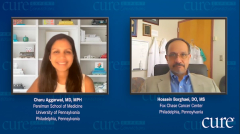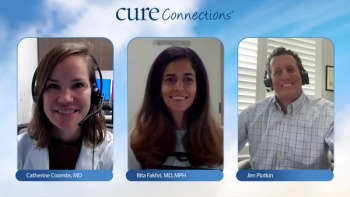
Adopting Precision Medicine in NSCLC
Take-home messages from a discussion on the use of biomarker testing, and newer, novel-based strategies to treat patients with non-small cell lung cancer.
Episodes in this series

Charu Aggarwal, M.D., MPH: In addition to a multidisciplinary management, I find that online resources for patients to determine the differences between chemotherapy and immunotherapy are quite useful. And like I said, there’s more direct-to-patient advertising now. Sometimes patients come to the clinic asking for a particular chemotherapy or immunotherapy.
This has been a fascinating conversation, Hoss. We’ve come such a long way. I’d say that patients with advanced non-small cell lung cancer should be empowered to ask their providers about testing, biomarkers, the stage of their disease, the histology, or the cell type of their disease. “Do I have nonsquamous non-small cell lung cancer?” Ask what kinds of testing should be performed. Ask if we can wait to get all of the information before beginning a treatment. Or even ask, in the opinion of the medical oncologist you meet, whether it’s imperative that treatment begin as soon as possible.
In the next few years, we’ll be using many more biomarkers. We’re using blood-based approaches. They’re turning around really fast. We get results back in about seven days now, and in the future, we’ll see even faster turnaround. We talked about how our tests sometimes don’t have the capacity to detect very low circulating tumor DNA. In the future, we’ll have tests that have a very low level of detection. These are really important pieces of information for people and our patients to know so that they’re informed and educated about the next steps. Hoss, what did I miss among these topics?
Hossein Borghaei, DO, MS: I don’t think you missed anything. As usual, you did a wonderful job of covering all of that. I absolutely agree with you. I don’t want to repeat everything you just said, but a well-informed patient is our best ally in all of this, and patients can be their own best advocate. I can’t overemphasize the concept of molecular testing and biomarker testing in general. I absolutely agree with you that this is just the beginning of biomarker testing. We’re going to see many more targeted therapies coming and more biomarkers to define the patient population who truly might benefit from one treatment versus the other. Whether it’s I/O [immunotherapy]-I/O, chemotherapy-I/O, or single-agent I/O, all those things are going to be important. And by I/O, I mean checkpoint inhibitors and immunotherapies.
We all know that other things are coming. There are potential vaccine studies that could be quite successful. Having a biomarker there might be helpful. We’re in a really interesting juncture in the treatment of metastatic non-small cell lung cancer. We’ve also noticed that we’ve taken what has worked well in the advanced setting to an earlier stage of disease. We didn’t get a chance to talk about that, but some of these immunotherapies and checkpoint inhibitors have been used very successfully in an earlier stage of disease.
There’s hope that as we learn more about the biology of this disease and how immunotherapy generally works, we’ll have better drugs, better regimens, and an even more significant impact on the care of our patients, like with lung cancer screening, for instance. The combination of finding the disease early and having an immunotherapeutic approach that can improve the rate of cures for our patients can be significant. It’s exciting.
My hope is that we won’t lose the momentum we’ve gained over the last 10 years and that we’ll keep building on it, and not just make incremental improvement, but make leaps and significantly impact the outcome. We have the tools and can get there. I just hope this pandemic comes to an end and we can reinitiate all of the collaborations and everything else that we were doing in a more fruitful manner.
With that, I’d like to thank you, first of all, Charu, for a wonderful discussion and conversation, and thank everybody who has joined us on this program.
Charu Aggarwal, M.D., MPH: Thank you, Hoss. That was great. I truly enjoyed being here with you and talking about lung cancer. Thank you.
Hossein Borghaei, DO, MS: Thank you.
Transcript edited for clarity.

